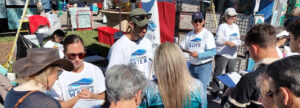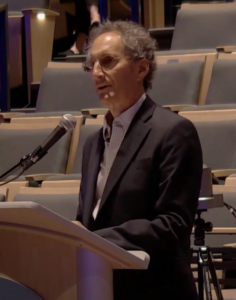The drive to amend the Florida constitution is back — bigger and shinier, now aiming for 2026.
By Johannes Werner
Original Air Date: Jan. 26, 2024
Host: The Right to Clean Water grassroots campaign in Florida died last fall. But now it’s reborn, aiming for the 2026 elections, and that in a bigger and shinier way. There was a pre-launch meeting on Facebook yesterday night, and we talked to a key figure behind the renewed campaign.
Johannes Werner: Last year, energized volunteers with clipboards swarmed farmers markets, neighborhood meetings, protests, and other public events in this area. Yard signs with the “Clean Water” logo popped up on residential streets. Surveys showed that Florida voters would overwhelmingly support an amendment that enshrines the right to clean water in the state constitution. 
But the petition drive fell far short of the nearly 900,000 signatures it needed to get a constitutional amendment on the ballot in the November elections. So, late last year, a month before deadline, the campaign’s organizers pulled the emergency brakes and stopped the train.
Joseph Bonasia was the communications director of the Florida Right to Clean Water campaign at that time, and he now spearheads a reboot that will try to get the amendment on the ballot in the 2026 midterm elections. We asked him about what went right and what went wrong, and what’s going to be different in the renewed campaign.
Bonasia came to the campaign as a retired teacher and chair of the Florida Rights of Nature Network. The campaign, he says, is driven by what’s going wrong in Florida.

Bonasia
Joseph Bonasia: I think there is very evidently a growing frustration on the political readings about the quality of our waters. Again, I live down here in Southwest Florida, and we are constantly looking over our shoulders for the next 2018-2019, when we had catastrophic Red Tide and blue-green algae blooms. Whether you’re talking about the loss of tens of thousands of acres of seagrass, if you’re talking about the Indian River Lagoon, where Manatees are dying, if you’re talking about Biscayne Bay having been on life support at times during the last few years, the level of fecal contamination — we have thousands of miles of rivers and streams that are contaminated with fecal bacteria — and, heck, there is growing frustration. We have been waiting patiently for the state to basically do its job to, protect our waters, to clean them up, to restore them. And that just isn’t happening.
JW: Here’s his take on what went right, and what went wrong in the campaign last year.
JB: We got a lot of things right. First, I’ll just note that we collected about 120,000 petitions of which little over 101,000 have been verified so far, by the Division of Elections. That’s pretty extraordinary for a purely grassroots effort with a shoestring budget. That’s the opinion of campaign professionals that we talked with since the campaign stopped petition gathering in November. We also did a really good job about raising public awareness regarding our amendment. We had lots of support, and newspapers published lots of op-eds. We had over 200 supporting organizations and businesses, and even some local governments that were supporting us in various ways. And so that awareness was very good. I think we have begun to build an expectation in the minds of a lot of Floridians that we should have a right, a fundamental constitutional right, to clean water, and eventually we’re going to have it. After about two years of these efforts, we now have a pretty good statewide infrastructure of seasoned and emitted volunteers. So we didn’t have this level of awareness on Earth Day 2022, when we launched. We didn’t have the infrastructure. Now we have both of these things, and that’s the foundation that we are going to be building upon. … It takes a lot of money in order to get the message out broadly enough. I said we build public awareness, and we did, but it wasn’t broad enough. We’ve heard in a lot of places that people have never heard about us. ‘How come I haven’t heard about you guys before?’ You probably know that there are much more headline-grabbing efforts right now, the abortion effort or the marijuana effort. I mean, both of those things have millions of dollars behind them, for paid petition gatherers and for advertising and such.
JW: So what’s going to be different this time around?
JB: A big difference between the last campaign and the upcoming campaign is that we have to have adequate money, that professionals come on board to help us out. A lot of that money will go towards that, we’re talking about millions of dollars. We’re looking at a targeted mail campaign, where we think we get a lot of bang for the buck, and then if necessary, we would go to pay petition gathers. But what we have been doing so far, is to be trying to get professional fundraisers on board, and we have been talking to a few of them. They are interested, and they tell us to continue. It’s only been a short while since we ended the last campaign. This is part of our transition. In fact, as I’m speaking to you right now, one of our board members is talking to a very highly regarded professional to move that conversation along some more, to see if he’s going to be on board.
JW: Bonasia counts on the volunteers of the just-ended campaign.
JB: We have our Right to Clean Water Ambassadors. These are people who have registered on our website to get updates, to participate in meetings, we have a little under 700 of them. Some of those people are not going to come back. You know, they gave a lot to the effort, and it’s time for them to take a rest. However, we will retain a lot of the most active people, some of them, frankly, have really not taken a break during this transition time. So we will have a lot of our volunteers back, and regarding the members of the board, almost everybody is sticking around for the next campaign.
JW: The language of the proposed amendment will be unchanged. He says he is confident the wording will pass muster of the Florida Supreme Court.
After the interview, Bonasia sent us an email with a clarification: He wants to make sure our listeners understand that the amendment is about the right of humans to clean water, not about granting rights to nature.
More information at https://www.facebook.com/floridarighttocleanwater.org/
This has been Johannes Werner, reporting for WSLR News
WSLR News aims to keep the local community informed with our 1/2 hour local news show, quarterly newspaper and social media feeds. The local news broadcast airs on Wednesdays and Fridays at 6pm.